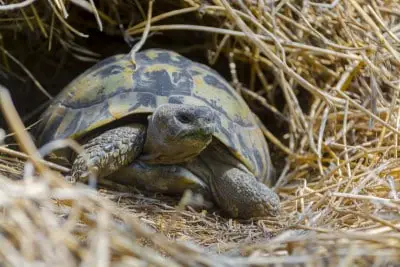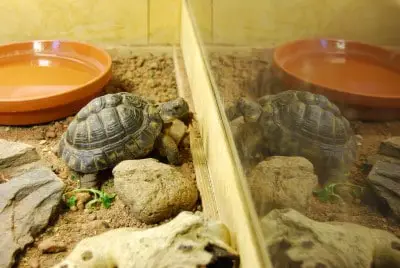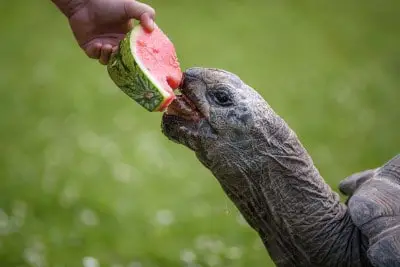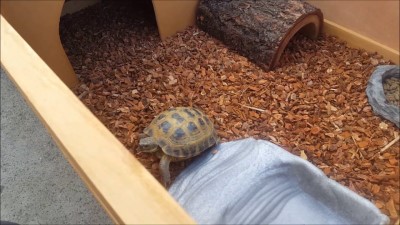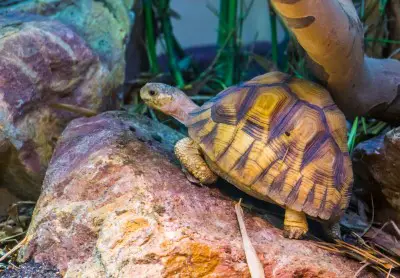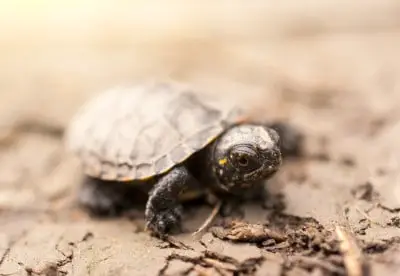Bringing any new pet into your home requires thorough research, adequate self-reflection, and an honest assessment of how willing you are to modify your life to meet their needs. Inviting a tortoise to your home is no exception, so you will want to know how good they naturally are as pets.
Are tortoises good pets? Tortoises can make good pets since they do not require much attention compared to other pets, are hypoallergenic, quiet, omnivorous, and have a long life expectancy. However, they require a large outdoor space, a controlled enclosure and climate, and they are not good short-term pets.
If you are convinced that you need to bring a tortoise into your life as a pet, be sure that you are purchasing a captive-bred tortoise. Wild-caught tortoises can be endangered once brought to a captive environment. Since tortoises are more long-term pets than anything, be sure that you read up on the requirements before deciding if this is the right pet for you (or not).
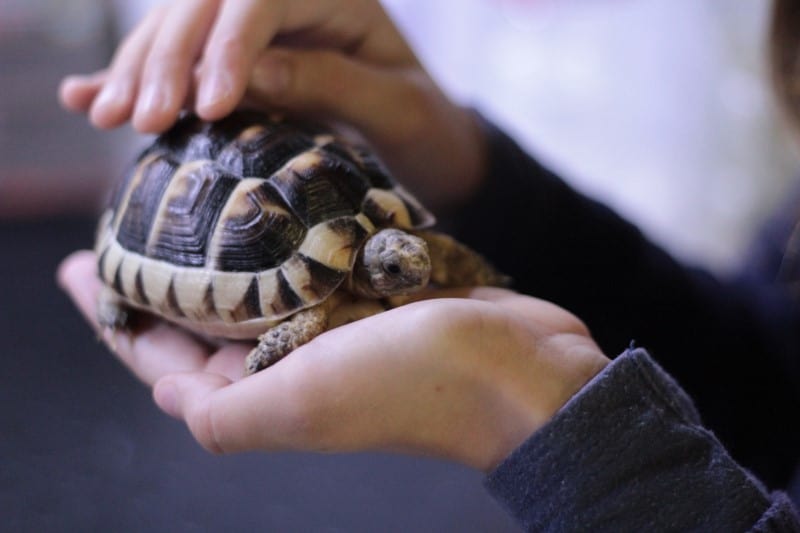
What are the Pros and Cons of Tortoises as Pets?
When making the decision about whether or not tortoises are good pets, you will want to weigh the pros and cons of your unique situation, desires, and ability to care for these animals well. Bringing an animal into a home with people who are unwilling or unsuited to care for it is dangerous to the pet and can bring harm to the potential pet owners as well.
With that said, it is important to decide if you will be able to care for a tortoise long-term before bringing it into your family. Once you decide to bring this animal home, be sure that you are ready for all of the fun memories that will accompany this pet should you be willing to put the work into providing it with a comfortable and happy life.
Let’s take a closer look at the pros and cons of tortoises as pets.
Pros of Tortoises as Pets
There are many pros of tortoises as pets. If you can get on board with the required care for these animals, then you will likely be pleased with having them as a pet. Consider the following reasons why tortoises make good pets:
- They do not require much attention compared to other pets. While you are sure to want to spend time with your new beloved tortoise, the good news is that your pet will not be upset if you are not around. Contrarily, tortoises actually enjoy the peace and quiet and can become rather shy when others are around.
This can work as a positive for many pet owners- especially for those who have limited time that they are able to dedicate to playing with or loving on their pets. Busy working professionals do not have to worry about the negative consequences of leaving their tortoise to themselves, as this actually benefits this type of animal.
- They are hypoallergenic. If you are looking for a pet that does not shed and does not have dander, then the tortoise might be a unique fit. While you will have to clean your tortoises’ enclosure, you will not have to worry about allergies while you are near this pet.
Taking home this pet will be a significant responsibility, so do not choose it just because it is the first hypoallergenic pet that you happen upon that you are interested in. But, if you consider all of the care that will go into owning this pet, then you can consider it an option that does not have to come with days full of sneezing and watery eyes.
- They are quiet. Not only are tortoises quiet in that they shy away from people, but these animals obviously do not make a lot of noise in the same way that a dog or other pet can.
Because this animal creeps around rather slowly (though it might move faster than you expect), they tend not to make much noise. Your neighbors will appreciate not having to listen to your tortoise at all hours of the day and night, and you will appreciate the silence, too.
- They are omnivorous. Omnivorous animals can consume less messy and, often, less expensive meals. You would be mistaken to only feed your tortoise pellets from the store as they need the nutrients that come from plenty of fruits and vegetables (among other foods).
If you are looking for an animal that you do not have to feed smelly kibble or slimy bugs, then you can look forward to the omnivorous diet of the tortoise that is easy to feed, prep, and provide. Tortoises eat a lot, though, so just be sure to be well-stocked.
- They have a long life expectancy. One benefit of having a tortoise is that they have a very long life expectancy when they are adequately cared for and provided for. Now, this can be tough when they can even live longer than their owners, so you will need to have a plan in place in case you go first. But, for the most part, it is a joy to learn and grow alongside these animals throughout the course of your life.
Since it is tough for captive-bred tortoises to transition to another home, the wild, or the zoo, you will be in it for the long haul once you bring home a tortoise. So, be sure that you are up for the commitment. But, your money will not go to waste as you invest in the proper equipment for your tortoise considering you will get many years’ worth of use out of it all.
Cons of Tortoises as Pets
Now that we have taken a look at several of the pros of having a tortoise as a pet, let’s consider the cons:
- They require a large outdoor space. Tortoises range in sizes depending on the variety that you bring home. Most of the time, these animals do their best in moderate climates, though some thrive in warmer temperatures. Either way, you will need to be sure that you have plenty of outdoor space to create an enclosure for your pets.
Because of their size and their desire to freely roam about, you will want to make sure that your tortoises are not entrapped in too small of an enclosure. Plus, your tortoise will need plenty of space to swim, eat, drink, etc. So, if you do not have enough space for all of this (and then some), then a tortoise is not for you.
- They need a controlled enclosure and climate. Your tortoise will also need a controlled enclosure as well as climate. Regarding the enclosure, these hefty animals can make a hearty escape as they burrow deep and are even known to climb. You will need a deeply-set enclosure, and preferably one that is roofed to avoid a tortoise escape.
Additionally, the climate needs to be able to be controlled. Since tortoises hibernate between 10-20 weeks of the year, you will need to be able to set the appropriate temperatures during the hibernation season (and when they are not hibernating, alike).
- They are not good short-term pets. The tortoise is a very long-lived animal. Although tortoises do not require a lot of personal attention, they do require a lot of care. You will need to do regular health checks and provide adequate bedding, food, and water for drinking and swimming. It can cost alot. Additionally, they require upkeep that some are not willing to continue.
Because of this, tortoises are frequently returned or sent to zoos, but not all zoos can accept the animals. As they can be harmful to new groups of tortoises, many zoos are unable to accept these pets, so you will be stuck unsure of what to do with them if you are unable to care for them. And, since they have a long life expectancy, this can be tough.
- They have associated health risks. Tortoises can have extra high health risks because of a few conditional factors. First, non-captive bred tortoises are at risk of negative health effects once they are made captive. So, you will never want to bring home a wild tortoise if you want it to survive.
Next, tortoises can transmit salmonella, so they are a health risk to others around them including other pets and people within your home. This is another reason that some zoos cannot accept new tortoises as they might be carriers of this bacteria.
Finally, they can become very angry when they are exposed to an environment that is unsuited for them. Along these lines, tortoises can be especially difficult when two or more males are in a group, so you will never want to bring two males together.
With this, they can cause health risks to you and your family. They are not good pets for children considering the animals do not like to be touched and handled- something that not all children are capable of resisting. And, since they can sometimes digest foods that are toxic to other animals, they can harm other animals if they are consumed (ex. if your dog tries to eat your tortoise).
Should I Get a Pet Tortoise?
If you are considering getting a pet tortoise, then you need to strongly consider all of the pros and cons of bringing this animal home. Assuming you have the time, space, and ability to properly care for a tortoise, they can be an easy-going pet that brings fun and joy to your life. But, if you are not willing to provide them the appropriate care, then you should consider another pet.
Read more:

